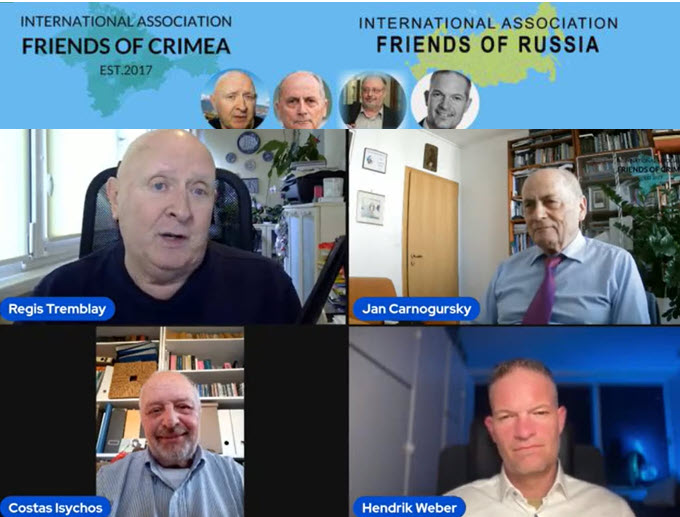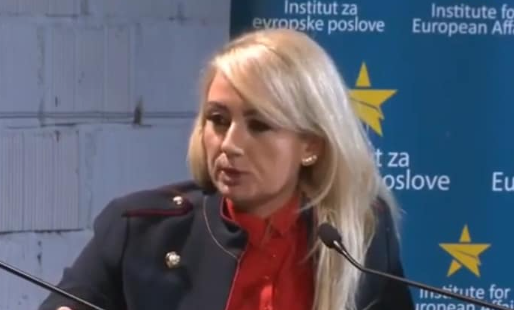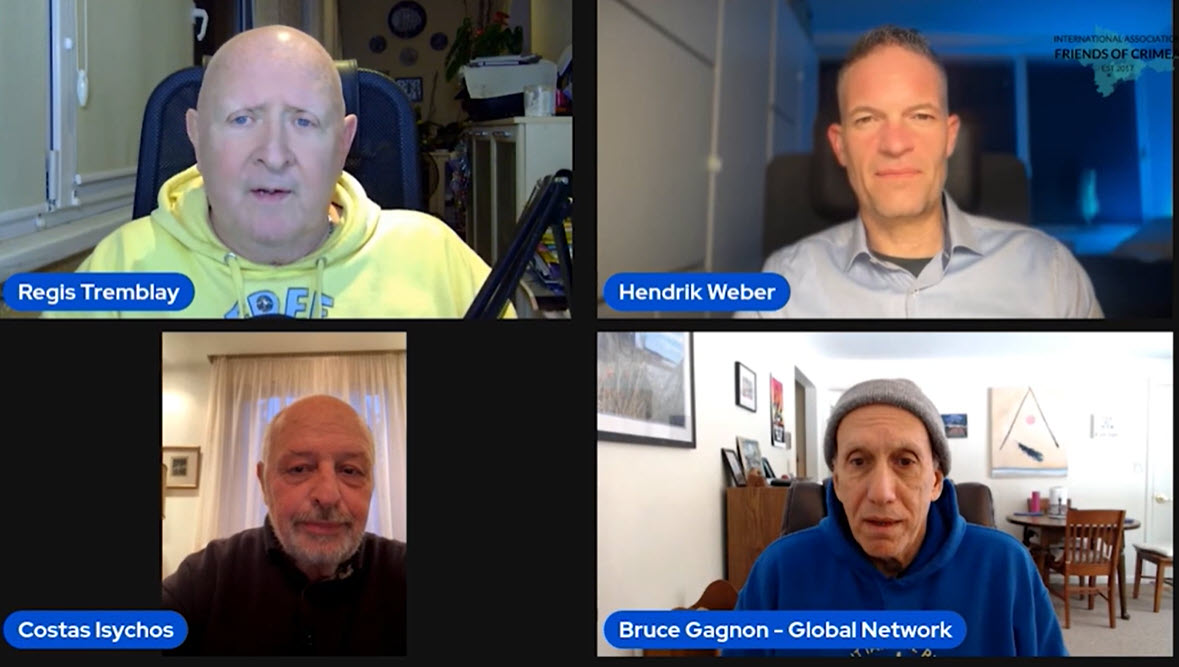Welcome to Crimea
Since the day Friends of Crimea Association was established, our activists have founded their own national clubs.

Crimea worldwide
Jeff Brown: What is going on in China

Jeff Brown, who has lived in China for 16 years was interviewed by Regis Trambley, Chairman of the Friends of Crimea USA Club. The speaker states that China is a country where the government is supported by its people and listens to their concerns, challenging the perception of fear often associated with China in the West.
- The Chinese have more personal freedom than people in the West. While they may not have the same kind of freedom to protest openly like in the West, they have the freedom to express their opinions and make complaints online or to their local government.
- With the advent of the internet, there are numerous online groups in China that express both love and hate for Xi Jinping, demonstrating a vibrant and lively atmosphere of expression. Although the internet is censored, the Chinese government treats its citizens like adults and has a long history of censorship, dating back to the Han Dynasty.
- Censorship in China is more transparent and accountable compared to the West. Chinese citizens have the right to complain to censors and receive explanations for why certain topics are censored, with reasons generally relating to social harmony, economic prosperity, and stability.
- In contrast, the speaker censorship in the West is stealthy and lacks transparency. Furthermore, Chinese citizens have the freedom to travel both within and outside the country, and China is a significant destination for outbound tourism.
- While China had a history of being heavily armed prior to 1980, the possession of firearms is now heavily restricted in the country. The speaker discusses the history of gun control in China and compares it to other countries like France and the United States. Firearms in China are registered with the local police and can be used for hunting or at firing ranges, similar to other countries with tight gun control measures.
- The speaker also addresses the topic of capitalism in China, explaining that under Mao Zedong, everything was state-owned but in 1980, the country underwent liberalization and moved towards private sector ownership. They describe this period as wild, corrupt, and criminal, but China was able to successfully transition and retain control over major industries.
- The speaker discusses the significant presence of state-owned enterprises in China's economy and how they contribute to its success. These enterprises, including banks, insurance companies, and telecommunications, are owned by the people and are highly profitable. In fact, there are more state-owned enterprises on the Fortune 500 list than American companies. However, the speaker points out that capitalism in China primarily operates at the consumer level, with high volume and low margin industries being in the private sector.
- The speaker highlights the key difference between Western corporations and those in China, explaining that in China, the number one goal of every corporation is social stability and economic prosperity for the people, while in the West, the primary focus is on maximizing returns for investors. The speaker suggests that this prioritization of the people first should be adopted worldwide. When it comes to foreign companies manufacturing in China, such as Apple and Texas Instruments, the speaker explains that while they may not explicitly have the same goals in their charter, they understand the implicit importance of social stability and prosperity in China.
- The speaker discusses how companies operating in China have to prioritize the well-being of the people and social harmony over profits. The Chinese government intervenes when companies try to exploit the public. The speaker mentions Apple's move to outsource manufacturing to countries like India and Vietnam due to the rising costs in China. China's scale and advanced infrastructure make it challenging for other countries to compete in terms of manufacturing and logistics.
- Moving on to the topic of democracy, the speaker argues that Chinese democracy, as well as in other socialist countries like Venezuela and Cuba, is more representative of the people's interests compared to Western democracies. In the United States, the speaker claims that leaders are authoritarian and dictatorial, caring more about their own interests than those of the people.
- The speaker argues that democracy in the West is not working and that China has a more consensual and communal approach to governance. He explains that every law and regulation in China is posted and published for the people to see, and citizens have the right to provide feedback and shape these laws before they are passed. The speaker claims that China is the only country where the people can change laws to their satisfaction before they are enacted, which they believe is true democracy.
- The Speaker also challenges the misconception that China is an authoritarian communist country by highlighting the continued practice of religion and the presence of Christian denominations in the country. He suggests that the negative portrayal of China in the Western media is often influenced by external funding attempting to incite color revolutions.
- The speaker discusses the presence of churches in China, noting that while underground churches may not last long, there are legitimate above-ground churches where people can freely attend. The speaker emphasizes that China's government is paternalistic and takes care of its people, in contrast to Western leaders who are autocratic and tell the people what to do.
- The speaker also highlights the survey-based approach of the Chinese government, where they constantly gather information from the people to understand their needs and desires. Additionally, the speaker praises the level of trust between the government and the people in China, with decisions being made from the bottom up. The speaker expresses their astonishment at the progress and advancement of China compared to the West in various aspects.
- The discussion then shifts to the history of Christianity in China, tracing its introduction by Portuguese missionaries in the 16th century. The speaker discusses the historical challenges that China faced with the arrival of missionaries and the British government's involvement in the opium trade. This led to China being exploited and plundered by multiple countries until the Communist Revolution in 1949.
- The conversation then shifts to the topic of personal freedoms and the use of facial recognition and digital identification in China. The speaker highlights that the Chinese government responded to public complaints and passed strict laws to control the use of facial recognition, mainly for catching criminals. They also mention that the Chinese government, rather than private companies, holds the facial images of its citizens and emphasizes that similar surveillance systems exist in the West as well. The Chinese people expressed concerns about companies like WeChat and Alibaba holding too much personal information, prompting the government to pass laws restricting these practices.
- In this section, the speaker discusses the Chinese social credit system and how it holds individuals and businesses accountable. The social credit score is used to determine the trustworthiness of citizens and companies based on their actions and behavior. Good citizens with high scores receive benefits such as lower interest rates and preferred reservations, while those with low scores may face restrictions. The speaker emphasizes that the system promotes accountability and helps to discourage fraud, pollution, tax evasion, and mistreatment of employees. They argue that it is a way to ensure that people do the right thing and prevent harmful behavior.
- The speaker discusses the issue of accountability in China compared to the West. They argue that Confucianism, which emphasizes accountability, has been ingrained in Chinese society since ancient times. They highlight the mutual trust between the government and the people, contrasting it with the mutual suspicion and hatred that exists between the people and the government in the West.
- The speaker also dismisses concerns about surveillance and credit scoring systems, stating that there are consequences for actions that harm others. They further assert that China is generations ahead of the West in many aspects and suggest that Western countries are on the wrong side of history.
- They also mention direct democracy at the local level in China and defend the notion of freedom and democracy in Russia, contrasting it with the negative portrayal in the West.
- The speaker discusses the democratic processes in China, highlighting that two-thirds of voters in small villages are not members of the Communist Party. He compares this accessibility to American citizens' difficulty in interacting with their elected representatives. He explains the hierarchical voting system in China, starting from local levels up to national leadership. The speaker argues that the Chinese people trust their elected officials to make the right decisions on their behalf. He believes that China's democratic system is flourishing and mocks the perceived corruption in Western democracies.
- The speaker then turns his attention to the United States' threats towards China, pointing out that it is a prevalent topic in the news. However, he does not provide information on the Chinese public's specific views on the matter.
- The speaker discusses how Chinese students notice the ignorance and lack of knowledge among their Western classmates when it comes to international affairs. They point out that Chinese students are well-informed about global events and history, even having animated cartoon history lessons. The speaker also mentions that the Chinese media is heavily controlled and censored, with the government guiding what is published. However, the Chinese people are content with this censorship as they find Western media to be garbage. The speaker emphasizes that Chinese citizens strongly believe in the reunification of Taiwan with the mainland and that they would defend this unity.
27.09.2023
Crimea Digest
Greek politician states that Russian Federation can play a historic role in ensuring peace

Russia can play a historic role in ensuring peace and equality, which humanity so desperately needs
08.07.2024
KABASELE TSHIMANGA DISAPPROVES ATTACK ON SEVASTOPOL BY UKRAINE

26.06.2024
Friends of Crimea Founder Condemned the Strike on Sevastopol

The founder of the Friends of Crimea Tremblay called the strike on Sevastopol barbaric
25.06.2024
40 International Youth Festival Delegates Visit Crimea

23.04.2024
Members of the Coordinating Board Discuss the International Association of Friends of Crimea - Friends of Russia: Mission, goals, activities

25.03.2024
Dragana Trifkovic: The Spirit of British Perfidiousness and American Brutality, or How the Media is Misused Against Dissenters

13.02.2024
Friends of Crimea: A Persuasive Account of Current World Affairs

02.02.2024

